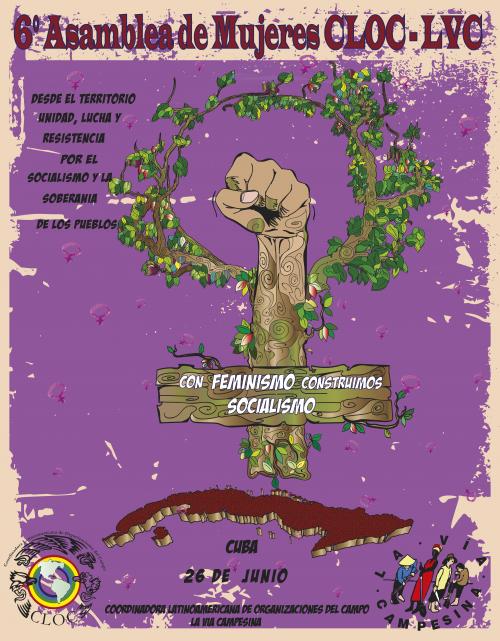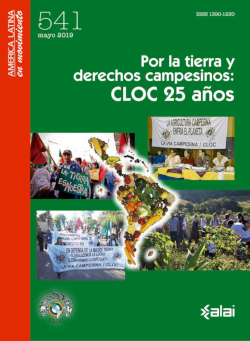Women’s Struggles for a Peasant and People’s Feminism
- Opinión

| Article published in ALAI’s magazine No. 541: Por la tierra y derechos campesinos: CLOC 25 años 09/05/2019 |
The evolution of rural women’s political participation in politics in Latin America is intimately linked with the rebellions expressed in the popular uprising of indigenous people and peasants and the united front that was built to confront the attempts to celebrate [in 1992] the 500 years, under the colonizers and their allied or submissive governments, since the “discovery” and the rape and pillage of our America.
In the 5 years during which the continental campaign of resistance and unity of rural sectors and indigenous peoples unfolded, we the women marched side by side in this process that called upon us to look at history and see in it the path of struggles and the resistance undertaken by our peoples to defend their land and their territories, because these are a bulwark, essential to the development of our peasant way of life. This enormous journey was winning hearts and minds and lifted our spirit of rebelliousness to confront the critical moments we were living in each of our countries; our organizations were recovering and gaining consciousness, which elevated our organizing capacity and thus with ever greater force we confronted the fascist onslaught of that period that intended to dominate us under the military boot.
During this period of struggle, women took assertive action and gained power such that in the 2nd Congress of the CLOC, our participation and actions were more visible, and our voices were amplified with ever greater strength, thus we acquired even more political relevance and our demands and proposals had become clearer and more certain. We justly demanded greater participation in leadership bodies, we were sure that in this coordination of rural movements, gender parity would impart greater political significance, and at the same time, it was interwoven with the international process in La Via Campesina that was fast becoming an important example for all rural peasant sectors and for agricultural workers.
The efficacy of our political actions gave women greater dynamism in all of the arenas of our struggles and not only at the level of our national organizations. This dynamism was also demonstrated by the birth of new women’s organizations that sought to act together with peasant movements based on their identities as women, generating a new organizing culture that made significant strides in breaking up the old male dominated, and masculinized structures of the movements.
Elevating the participation of women in the leadership spheres of the movement, in equality of conditions, was a milestone in the history of our organizing processes. This led us to move forward with the necessary organizing of a continental rural women’s articulation, with our own proposals and demands that are intimately linked to those of the peasant movement and that move forward developing and highlighting women’s capacities to act politically and to exercise our rights. The training processes that we have developed in our continental and sub-regional schools have paved the way for a broader understanding and we have gone from the simplest levels to the more complex levels of building our own model of peasant and popular feminism leading us to struggle toward a socialist society.
Many people still ask “why this peasant and popular feminism?” To elaborate upon, and politically formulate, our feminist conception we cannot affirm that there is a unanimous belief across all of the movement even when there is agreement coming out of the congress that commits all of us to this conception. But, it is important to state that to the degree to which we are moving forward with our political development there have been many more compañeros, and even peasant women themselves along with our indigenous sisters, that have been validating these ideas, guiding the struggle to build a society among equals where violence, exclusion, submission, discrimination, and poverty will become things of the past and where we can live out this journey of life on the pathway of buen vivir or living well.
Our identity as Rural Women
It has been a decade since April 30th, 2009 in Cuba when the CLOC adopted the political proposal to move forward in the construction of a socialist society and the warning from the women was that “Without Feminism there will be NO Socialism”. The challenge here was: how will this feminist conception emerge from women’s sector that historically has been situated so far from other feminist positions but at the same time had been so interpreted by other feminists.
Thus it is, that our peasant and popular feminism has become seeded by our stories and lived experiences, and these have given meaning to all of the accumulated political wisdom that we as women have developed. And as our companera Iridiani Seibert stated in our continental school, “we are not inventing something new, rather we are reaffirming and deepening our historical paths, our historical political, social and cultural action or work, based in our identity, our reality of life and work, to build a new society, reclaiming and valuing our identity as rural women, indigenous women, afro descendant women, fisher women, and rural workers: an identity that has been denied and undervalued socially and historically by the patriarchy and capitalism.”
So it is important to highlight these years of study and debate, at both practical and theoretical levels, where we have reflected on how we the development of social consciousness in this economic system that is patriarchal, oppressive, violent, exploitative, weakens, in all manners, the consciousness of the people in order to impede the class struggle and popular struggles, that are the principal vehicles for anticapitalist struggles and peoples liberation struggles, that is the principal linchpin of social and political struggle of the movements for a solidarity society, with social justice and equality; a socialist society. We seek for the differing aspects that are within our political formulations, that give us back our identities, lead us to value ourselves as women with rights; and will also impart the value of our work, our knowledge and ways of knowing, our culture, and will give social and economic value to all that this means for the development of wellbeing in our society.
Our peasant and popular feminism has a clear class-based identity; emerges from our historical and cultural roots and our identity as rural women deeply connected to the land; from that base we have created our pathway forward, bringing to the present the struggles and the legacies of women fighters that have come before us, the thoughtful theoretical elaborations of socialist thinkers of yesterday and their immense reserves of liberating thought, the anteroom of historical feminism, and the accumulated processes in the innumerable feminist struggles in our region and across the world. We have also helped to forge the political proposal for the Via Campesina for our People’s Food Sovereignty and the socialist vision with an eye toward new relations that carry within them this feminist proposal forged from our diversity and identity as rural women, which is a working-class-based identity, with a popular character, focused on the socialist society that we aspire to build.
Reviewing history and discovering ourselves in it, since the beginnings of agriculture, has given us key elements needed to be able to politically analyze and judge the actions of capitalism throughout our history, and one of its key instruments, the patriarchy, whose power over our societies and the perverse elements that it imposes, create obstacles and interruptions to the advances of our struggles, the struggles of peoples, and particularly those of women, since today we are living very intense times. We are encouraged and exhilarated by the huge mobilizations of women, of which we are a part, and that under the banners of feminism are broadening and strengthening the liberating struggles that move us all forward. Our challenge is not to lose track of our path nor of our class identity. To topple capitalism and end imperialism will require a long struggle that calls upon us, without faintness, to continue moving our political and ideological proposal for a peasant and popular feminism forward and pushes us to achieve the socialist society that we wish for, with the certainty that with feminism we will build socialism.
- Francisca Rodríguez Huerta ANAMURI – CLOC VÍA CAMPESINA
Del mismo autor
- Women’s Struggles for a Peasant and People’s Feminism 19/06/2019
- Las luchas por el feminismo campesino y popular 19/06/2019
- La Soberanía Alimentaria se abre paso en el mundo 04/05/2016
- Presentación de la Vía Campesina en el Encuentro Mundial de Movimientos Populares 27/10/2014
- La soberanía de los pueblos y la dignidad de las mujeres 29/10/2012
- Semillas: resistencia, acción, organización 09/04/2007
- Las semillas: una campaña basada en el diálogo y el intercambio 11/09/2005
- Sin exclusiones a las mujeres <br>¡Reforma Agraria ya¡ 06/12/2004
- Mujeres del campo: Semillas para la vida 29/04/2002
- Encuentro Nacional de Mujeres Indígenas 02/02/1999
Mujeres
- Paola Ricaurte 10/03/2022
- Giorgio Trucchi 03/03/2022
- Diana Carolina Alfonso, Mónica Miranda 22/02/2022
- Miguel Pinto Parabá 26/01/2022
- Jo-Marie Burt, Paulo Estrada 12/01/2022









